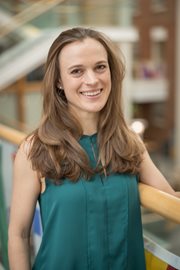Samantha Tulenko
 Samantha is an MD/PhD student at the University of North Carolina School of Medicine and UNC Gillings School of Global Public Health. She is currently a fourth year PhD candidate in infectious disease epidemiology under the mentorship of Drs. Emily Gower and Peyton Thompson. Her research focuses on optimizing vaccine performance in low- and middle-income countries, specifically looking at the immunogenicity of birth dose vaccination for hepatitis B and the impact of malaria infection on measles vaccine response. Samantha’s work in public health began as a student in Vietnam, where her experiential coursework studying the history of the HIV/AIDS epidemic convinced her of the power of using population data to inform policy and, in turn, improve public health. She continued to develop these interests while working on an indoor air pollution project in rural Bangladesh, as a coordinator for a glaucoma incidence and progression study in Tema, Ghana, and as a research assistant for an intervention aimed at improving trichiasis surgeons’ skills in Ethiopia. These experiences inspired her passion to work on applied public health interventions to respond to community-informed gaps in healthcare. Outside of her work, Samantha volunteers with the UNC Humanitarian Health Initiative to support global organizations working in humanitarian settings and as a medical student in the central NC community where she was raised. She is an avid triathlete and amateur small-scale flower farmer.
Samantha is an MD/PhD student at the University of North Carolina School of Medicine and UNC Gillings School of Global Public Health. She is currently a fourth year PhD candidate in infectious disease epidemiology under the mentorship of Drs. Emily Gower and Peyton Thompson. Her research focuses on optimizing vaccine performance in low- and middle-income countries, specifically looking at the immunogenicity of birth dose vaccination for hepatitis B and the impact of malaria infection on measles vaccine response. Samantha’s work in public health began as a student in Vietnam, where her experiential coursework studying the history of the HIV/AIDS epidemic convinced her of the power of using population data to inform policy and, in turn, improve public health. She continued to develop these interests while working on an indoor air pollution project in rural Bangladesh, as a coordinator for a glaucoma incidence and progression study in Tema, Ghana, and as a research assistant for an intervention aimed at improving trichiasis surgeons’ skills in Ethiopia. These experiences inspired her passion to work on applied public health interventions to respond to community-informed gaps in healthcare. Outside of her work, Samantha volunteers with the UNC Humanitarian Health Initiative to support global organizations working in humanitarian settings and as a medical student in the central NC community where she was raised. She is an avid triathlete and amateur small-scale flower farmer.

Understanding the Impact of and Promoting Hepatitis B Birth Dose Vaccination in the DRC
Kinshasa School of Public Health & Université Protestante au Congo, Kinshasa
Democratic Republic of Congo
What does the Kean Fellowship mean to you?
I am honored to have been selected as a Kean Fellow. The Kean Fellowship provides me the opportunity to take my doctoral research beyond the computer and into the field. While I have been working closely with my Congolese colleagues on this project for three years virtually, meeting face-to-face and developing relationships with the study team members will enrich my current dissertation work and future collaborations. Receiving the Kean Fellowship means I will be able to spend an extended time in Kinshasa with my colleagues, far longer than would have otherwise been possible. This longer trip gives me time for high-impact presentations with project stakeholders as well as time with the study team during their routine work with participants.
What do you anticipate learning?
The primary goals for my trip are to answer questions about loss-to-follow-up in the hepatitis b birth dose study, to better understand the study population in order to appropriately contextualize my study findings, and to gain insight about priorities for future HBV birth dose vaccine research. I anticipate achieving these goals through formal presentations and informal conversations with stakeholders, study staff and healthcare personnel at our study maternity centers. While I have written out the tasks I intend to accomplish during this trip, I anticipate that I will learn far more than what is planned on paper during this trip. Working with our study team for an extended time will provide me a greater understanding of the challenges that researchers face in Kinshasa, DRC, and the strategies they employ to overcome these obstacles. Spending time at our partner maternity centers will provide me with insight into the healthcare system in Kinshasa, such as challenges with infant vaccination, barriers to prenatal care, and cultural preferences regarding maternal healthcare. From all this, I hope to become a better collaborator and researcher as I continue working with partners in Kinshasa.
What interests you about tropical medicine and what problems are you interested in solving?
Tropical medicine combines my interests in environmental and human health and my desire to contribute to meaningful improvements in global health. In my future career as a physician-scientist, I aim to bridge epidemiology and clinical medicine at the intersection of infectious diseases, child health and interventional epidemiology. Ultimately, I aspire to conduct applied research that expands access to and effectiveness of life-saving vaccines. I want to be part of a global health community that sees the eradication of vaccine-preventable diseases such as hepatitis B.